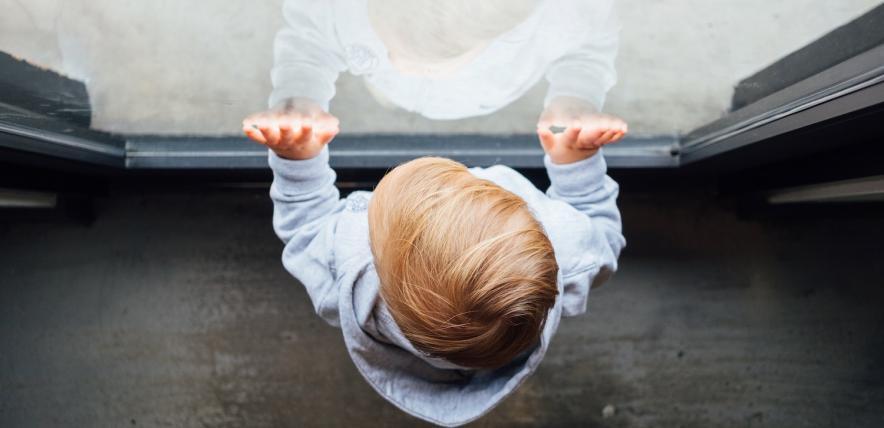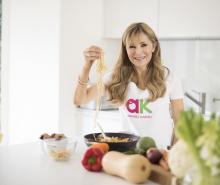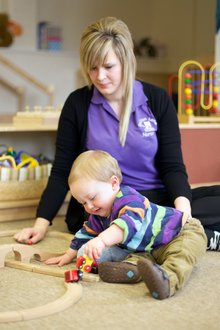Hannah Howells gave birth to her second son Wilf during lockdown. Wilf is now one and about to start nursery and Hannah wonders if a year of only knowing a few faces will affect his development. And how will lockdown affect her four-year-old son Theo? Hannah gives us her insights and talks to an early years professional and a child psychologist about what support we can offer children after this year.
By Hannah Howells
For the first year of his life, my son, Wilf, has grown used to seeing the same faces and going to the same places.
He has had close contact with just a handful of people and has spent most of his time at home. He knows no different, but we do.
We know that he didn’t experience those newborn cuddles with our family and friends. We know that he has only met one set of grandparents once. We know that he is yet to have interacted with other babies.
There is so much that he has missed out on, as have the other 600,000 babies born during lockdown.
As a parent, it seems only natural to worry about what has been lost and what lies ahead.
Barriers and distance are the norm
Faces on a screen, window meets and distanced walks are all normal for Wilf; he has grown up knowing no different.
But our four-year-old, Theo, realises that there was a life before Covid – a life where he didn’t ask to use antibac at the park or where he would have to stay home from preschool ‘because of the nasty germs’.
As an adult, I struggle to comprehend what has happened this past year and like many, there are days that I find unbelievably tough.
So how on earth must a young child feel?
Stella Freebody, the manager of Oak Tree Nursery, believes that children’s personal, social and emotional development has been hugely impacted upon as result of the pandemic.
“Every child has been affected. Whilst I dislike using the term ‘lockdown delay’, there is a great deal of work to be done to close the gaps now,” she says.
She explained that the simplicities of children interacting with their peers at the park or learning social cues from other adults at family gatherings means that many now have confidence issues.
Offering comfort, connection and understanding
In March 2020, Psychologists Dr Gail Sinitsky and Dr May Lene Karlsen launched the Children Heard project, where over 500 children aged between 3–18 were given a voice to share their feelings and views about the pandemic in written and art form.
Children expressed negative feelings, understood their limited freedom and were concerned for those they missed.
As a parent, I found this report to be incredibly interesting and so moving too – such a lot resonated with things I had experienced with my own child.
The darting out of the way of people on the street. The questioning of whether we were allowed to touch family when we saw them. The questioning why we had to stay at home.
There has been a fine line between feeling proud of my child’s understanding but also sad that this is also part of their world.
Should I be explaining and comforting, or trying to distract my child from the seriousness of what is going on?
Dr Sinitsky advises that parents should connect, communicate and empathise with their child.
“Your child may show their feelings to you in so many different ways - through talking, play, sleeping or eating. Be open to what your child may be feeling and offer comfort and understanding,” she says.
Preparation is deemed really important too – be it through books, stories or role-play, particularly during times of transition, such as starting school.
“Young children often process and express their feelings and experiences through free-play or art, so engaging with these activities with your child can be really powerful,” she suggests.
Keep communicating with your child's early years setting
With one of my children about to start school in September and another who begins nursery at the end of April, naturally I have apprehensions about the changes that lay ahead – more so given that our world has been so small for the past year. So as we ease out of lockdown, how can we support our children and ourselves to ensure that we manage all of this well?
Stella Freebody told me that settings are doing their utmost to put parents and children at ease given that anxieties have heightened over lockdown.
She insists that being “consistently consistent” is so important in supporting children through this time.
“Parents should speak to staff at their child’s setting if they need any advice. I know I speak for all early years practitioners when I say that we love all the children who come to us and treat them as if they are our own. Rest assured that we are working our hardest to ensure they are happy.”
It's not all bad...
Praising children’s resilience, Stella also claims that there have been “so many positives”, particularly as children have returned to nursery and been overjoyed to reunite with their friends.
Dr Sinitsky agrees that the pandemic has also brought some very meaningful experiences to children too.
“More time with family and the slower pace of life has helped many children to feel calmer. We know also how significant play and being outdoors is for development too, and these things have also contributed to more positive experiences,” she said.
So, as parents, whilst we navigate the challenges ahead, we must also try to hold on to what we have learned during the pandemic as well.
Communicating feelings, adapting and finding the positives are not only key to moving forwards, but key to supporting ourselves and our children too.
Though the past year has been tough, there has been a great deal of togetherness too – and with brighter days on the horizon, long may that continue.
Where next?
5 ways to prepare your child to return to childcare or school








